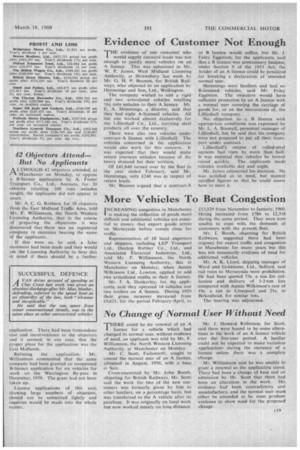Evidence of Customer Not Enough
Page 55

If you've noticed an error in this article please click here to report it so we can fix it.
THE evidence of one customer who I would supply outward loads was not enough to justify more vehicles on an A licence. This was subrnitted to Mr. W. P. James, West Midland Licensing Authority, at Shrewsbury last week by
Mr. a H. Beames, for British Railways, who objected to an application by Hemmings and Son, Ltd., Wellington.
The company wished to add a rigid and two articulated vehicles totalling 16i tons unladen to their A licence. Mr. E. A. Hemmings, a director, said that they had eight A-licensed vehicles. All but one Worked almost exclusively for the Lillieshall Co., Ltd., carrying steel products all over the country.
There were also two vehicles under contract-A licence with Lillieshall. The vehicles concerned in the application would also work for this concern. It was expected that they would make return journeys unladen because of the heavy demand for their services.
Of £41,840 turned over by the fleet in the year ended February, said Mr. Hemmings, only £240 was in respect of return loads.
Mr. Beames argued that a contract-A or B licence would suffice, but Mr. J. Foley Egginton, for the applicants, said that a B licence was unnecessary because, under Section 9 of the 1953 Act, the holder of an A licence could be penalized for breaking a declaration of intended normal user.
Hemmings were hauliers and had no B-licensed vehicles, said Mr. Foley Egginton. The objectors would have sufficient protection by an A licence with a normal user covering the carriage of goods for, or on the instructions of, the Lillieshall company.
No objection to a B licence with appropriate conditions was expressed by Mr. L. A. Braman, personnel manager of Lillieshall, but he said that his company were not prepared to put all their transport under contract.
Lillieshall's output of rolled-steel sections had risen by more than half. It was essential that vehicles be turned round quickly. The applicants made vehicles available day and night.
Mr. James adjourned his decision. He was satisfied as to need, but wanted certified figures so that he could assess how to meet it.
























































































































